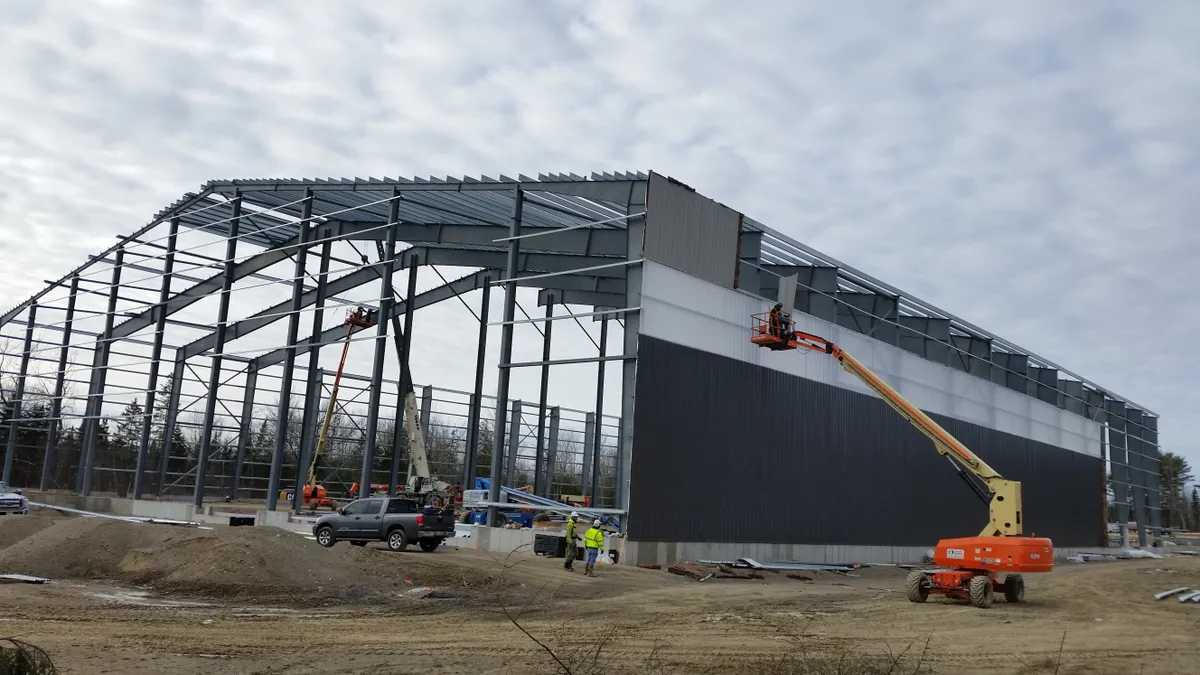UPDATED, May 10, 2018: Fiberight CEO Craig Stuart-Paul and his colleagues held a town hall meeting on Tuesday to discuss construction delays of its waste-to-biofuel facility in Hampden, ME, according to the Bangor Daily News.
Waste Dive reported in April — when the facility was originally scheduled to open — that it would not be ready for the foreseeable future, however Stuart-Paul this week suggested the facility will be ready by December, with the recycling portion of the facility running by September. He also confirmed that the company will continue to host regular town hall meetings until the facility is open.
"It will work," Stuart-Paul said at the meeting, according to the Bangor Daily News. "We will prove it to you."
Dive Brief:
- The Fiberight facility currently under construction in Hampden, ME will not be ready to open for the foreseeable future, as reported by the Bangor Daily News. The $70 million facility was originally scheduled to open in April, though that got pushed back to May earlier this year.
- CEO Craig Stuart-Paul cited a heavy winter as the main reason for this delay. In a March 29 letter to the state Department of Environmental Protection, the company said it planned to begin commissioning the material recovery facility portion in Q2. During that period it will also be constructing anaerobic digestion capabilities with a goal of full commissioning by Q4.
- The Municipal Review Committee (MRC), which represents the communities that have agreed to contract with Fiberight, outlined temporary disposal plans in its own March 28 letter to members. During this interim period, some materials will be going to the Waste Management-operated Crossroads Landfill and some to the Casella-operated Juniper Ridge Landfill.
Dive Insight:
The Fiberight facility has generated significant debate throughout northern Maine in recent years, but eventually prevailed and appeared to be on track with financial commitments via bonds and private equity announced in January. This comes as existing contracts between MRC members and Penobscot Energy Recovery Corporation (PERC) waste-to-energy facility have expired. In the lead up to that point, PERC has attempted to derail the project via legal challenges and permit appeals. Some MRC members have chosen to take their business elsewhere as this plays out.
This led Fiberight to downgrade its initial capacity expectations to 105,000 tons per year, servicing 83 member municipalities, with the potential for further growth. According to the company's recent DEP letter, that full capacity is on track to be commissioned by Q4. An additional expansion is still planned for Q1 of 2019, at which time Fiberight can take outside material from Casella and others.
Once fully operational, Fiberight has promised an 80% recovery rate for traditional curbside recyclables. The remaining organics will be processed into biofuels. This type of mechanical biological treatment system is an intriguing one, featured in research papers and presentations, but still far less common in the U.S. industry. Some view this as an opening for new processing technologies, others as a cautionary sign that they're not ready for primetime. Stuart-Paul is currently scheduled to present on this topic at WasteExpo later this month.















